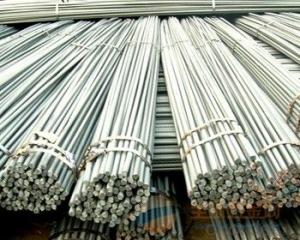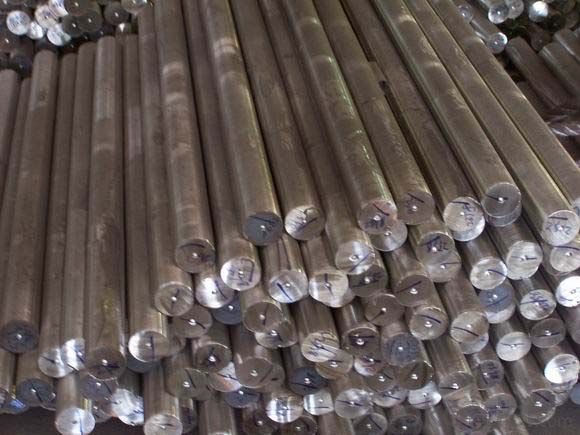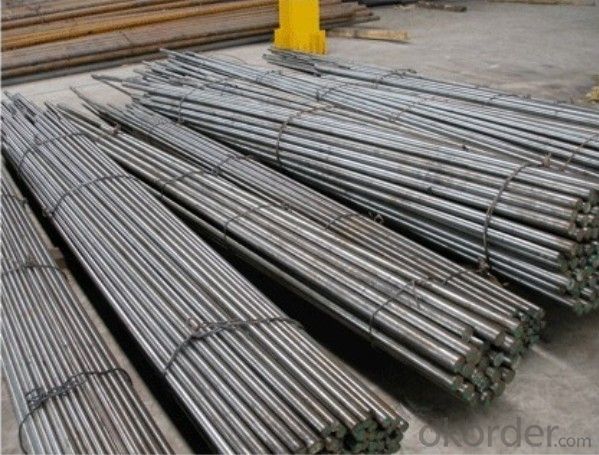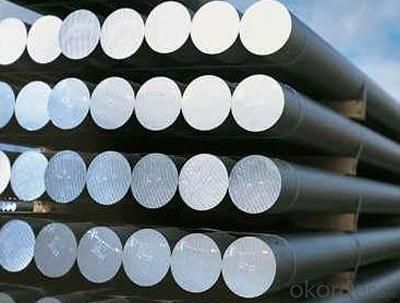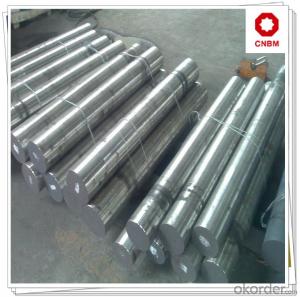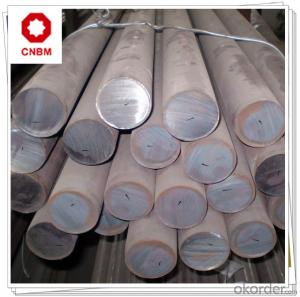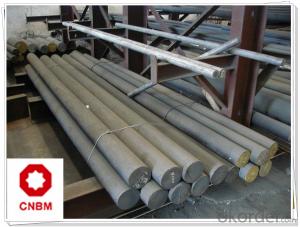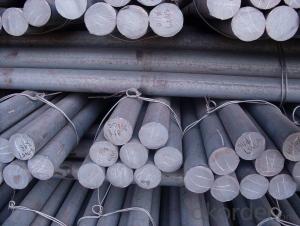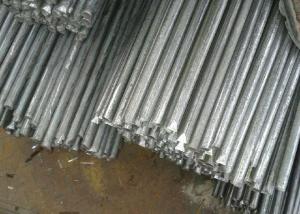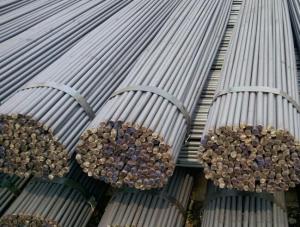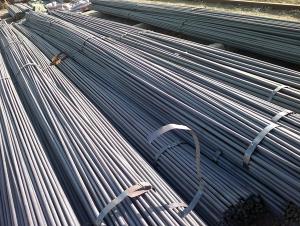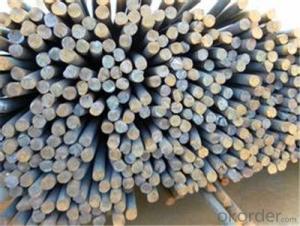good quality round steel bar for construction
- Loading Port:
- Tianjin
- Payment Terms:
- TT OR LC
- Min Order Qty:
- 25000 m.t.
- Supply Capability:
- 10000 m.t./month
OKorder Service Pledge
OKorder Financial Service
You Might Also Like
Specifications of Round Bar
1. Grade: Q195, Q235, Q345
2. Diameter: 6mm-150mm
3. Length: 6m, 9m, 12m or as customer’s request
4. Tolerance: Within ±5% for weight; ±2mm for diameter
5. Note: The price can be better is the quantity is good
6. Chemical composition
Alloy No | Element (%) | ||||
C | Mn | S | P | Si | |
Q195 | 0.06-0.12 | 0.25 | ≤0.05 | ≤0.045 | ≤0.3 |
Q235 | 0.12—0.20 | 0.3—0.7 | ≤0.045 | ≤0.045 | ≤0.3 |
Q345 | ≤0.2 | 1.00-1.60 | ≤0.045 | ≤0.045 | ≤0.55 |
Usage and Applications of Round Bar
1. Chinese standard steel bar is often used where large amounts of steel need to be formed, for example as structural steel.
2. And we can use this kind of product on the performance of the mechanical parts if the demand is not very high.
3. Steel round bar is used in construction and a large number of architectural and engineering structures.
Packaging & Delivery of Round Steel Spring Bar:
-Packing Detail: The products can be packed in bundles by steel wires.
-Delivery Detail:
1, Delivery time: 30~45 working days after receive buyer’s T.T. or L/C.
2, Delivery status should be written in the contract. (Heat treatment or no)
Payment:
-Invoicing on theoretical weight or actual weight as customer’s request.
-FOB, CFR or CIF.
-Regular terms of payment:
1, 30% payment in advance, the remaining balance (70% payment) against the copy of B/L. 100% payment before shipment.
2, 30% payment in advance, the remaining balance (70% L/C) against the copy of B/L. 100% payment before shipment.
3, Negotiable.
Photos of Round Steel Spring Bar:
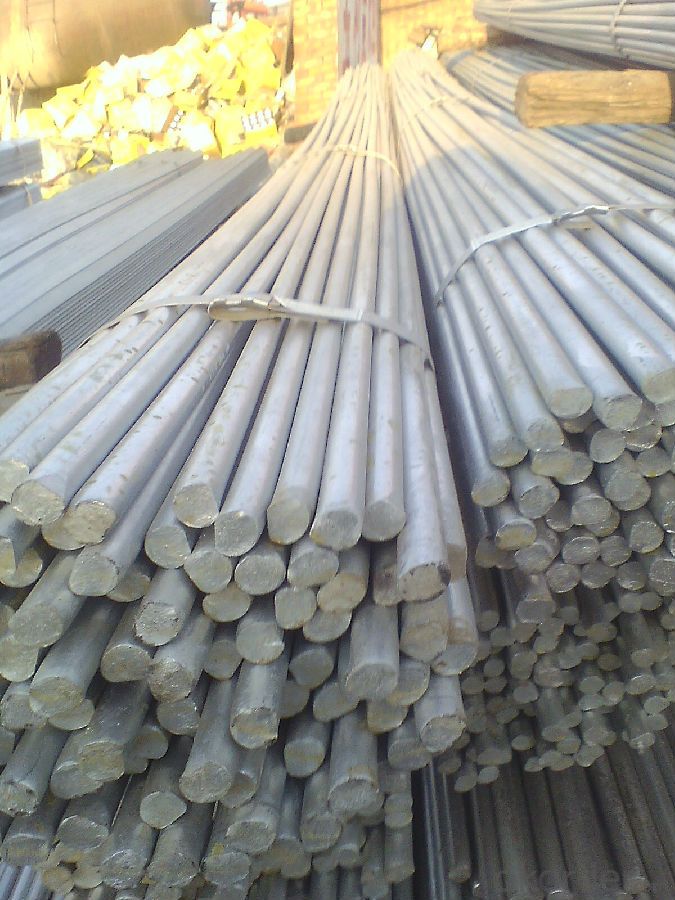
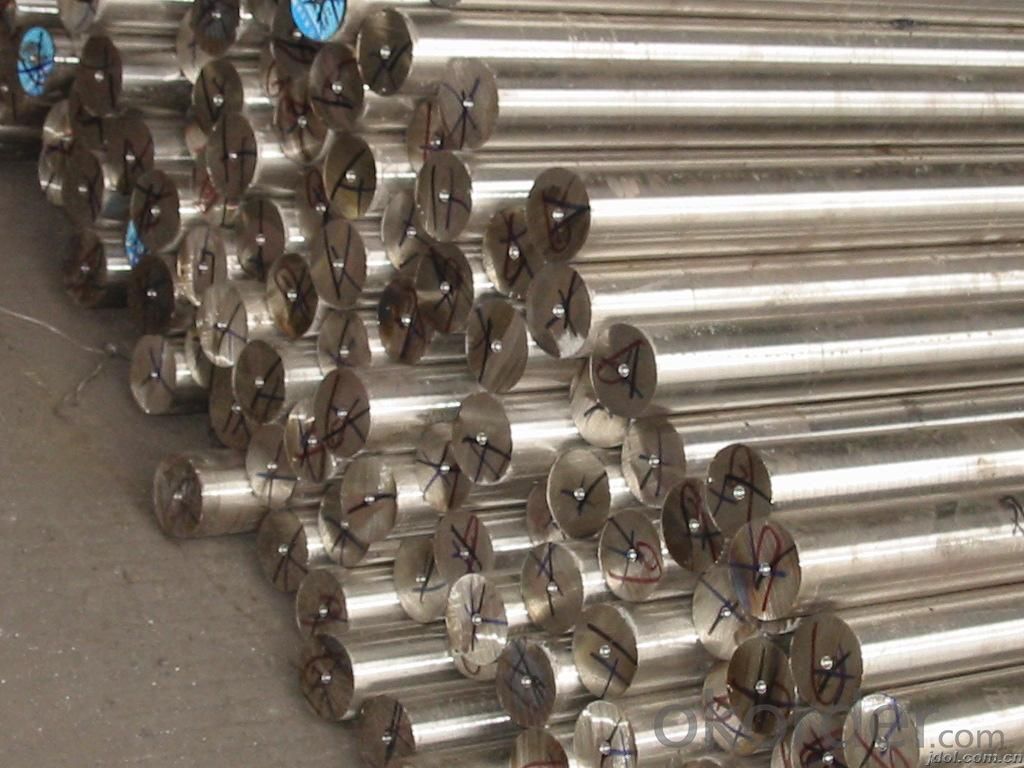
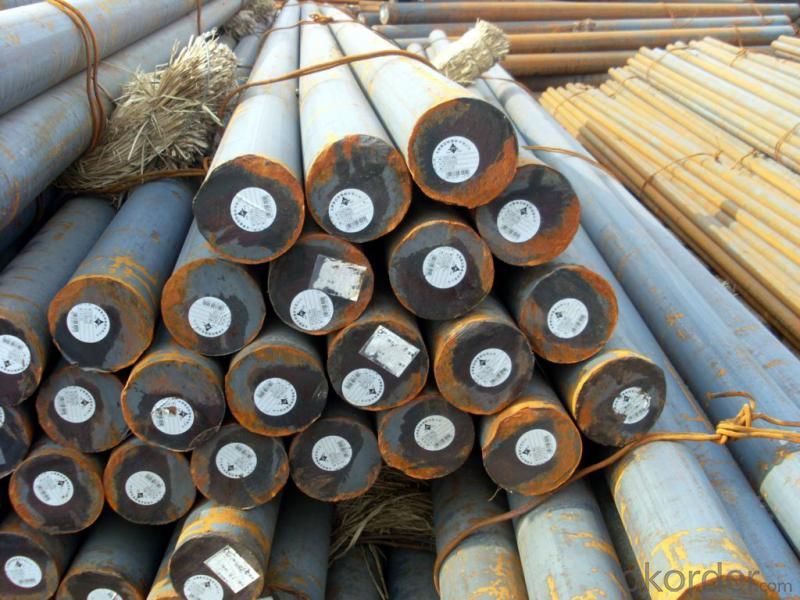
- Q: What are the advantages of using bearing steel round bars?
- There are several advantages of using bearing steel round bars. Firstly, bearing steel has high hardness and wear resistance, which ensures durability and longevity of the bearings. Secondly, bearing steel has excellent dimensional stability and can withstand high temperatures, making it suitable for applications with heavy loads and high-speed rotations. Additionally, bearing steel round bars have excellent surface finish and low friction coefficient, resulting in smooth and efficient operation. Lastly, bearing steel has good corrosion resistance, reducing the risk of rust and prolonging the lifespan of the bearings.
- Q: What are the common sizes of steel round bars?
- The common sizes of steel round bars vary, but some frequently used diameters range from 1/4 inch to 12 inches.
- Q: What is the difference between a rough turned and a polished steel round bar?
- A rough turned steel round bar has undergone a preliminary machining process that removes surface imperfections and excess material, providing a slightly smoother finish. On the other hand, a polished steel round bar has undergone further polishing or grinding processes to achieve a much smoother and aesthetically appealing surface finish.
- Q: What are the advantages of using nickel-chromium-silicon alloy steel round bars?
- There are several advantages of using nickel-chromium-silicon alloy steel round bars: 1. High temperature resistance: Nickel-chromium-silicon alloy steel round bars have excellent resistance to high temperatures, making them ideal for applications that involve exposure to extreme heat. They can withstand temperatures up to 1200°C without losing their strength or structural integrity. 2. Corrosion resistance: These alloy steel round bars have good corrosion resistance, particularly in environments where they are exposed to acids, alkalis, and other corrosive substances. This makes them suitable for use in industries such as chemical processing, oil and gas, and marine applications. 3. High strength and durability: Nickel-chromium-silicon alloy steel round bars have high tensile strength and toughness, which allows them to withstand heavy loads and resist deformation. They are known for their exceptional durability and long service life, even under demanding conditions. 4. Excellent mechanical properties: These alloy steel round bars exhibit excellent mechanical properties, including good ductility, impact resistance, and fatigue strength. This makes them suitable for various applications that require high performance and reliability, such as structural components, machine parts, and tools. 5. Ease of fabrication: Nickel-chromium-silicon alloy steel round bars can be easily machined, welded, and formed into various shapes and sizes. This allows for greater design flexibility and ease of fabrication, making them a preferred choice for manufacturers. 6. Cost-effective: Despite their numerous advantages, nickel-chromium-silicon alloy steel round bars are relatively cost-effective compared to other high-performance materials. Their long service life and resistance to wear and tear make them a cost-efficient choice in the long run, as they reduce the need for frequent replacements and maintenance. Overall, the advantages of using nickel-chromium-silicon alloy steel round bars make them an excellent choice for applications that require high temperature resistance, corrosion resistance, strength, durability, and ease of fabrication.
- Q: What is the difference between a cold-drawn and a polished steel round bar?
- A cold-drawn steel round bar is typically produced by pulling a hot-rolled bar through a die, resulting in a smoother and more precise diameter. On the other hand, a polished steel round bar undergoes an additional process of grinding or buffing to achieve a smooth and shiny surface finish. While both bars offer improved surface quality, the cold-drawn bar primarily focuses on dimensional accuracy, while the polished bar enhances aesthetics and corrosion resistance.
- Q: What are the advantages of using alloy steel round bars?
- Alloy steel round bars offer numerous benefits. Firstly, they possess superior strength and durability, surpassing regular steel bars. This quality is particularly advantageous in industries like construction, automotive, and aerospace, where high strength and toughness are crucial. The inclusion of alloying elements enhances their mechanical properties, making them highly resistant to wear, impact, and corrosion. Moreover, alloy steel round bars exhibit exceptional heat resistance. They can endure high temperatures without compromising their strength, making them suitable for environments like furnaces, boilers, and heat exchangers. This attribute extends their service life and reduces the need for frequent replacements. Another advantage lies in the versatility of alloy steel round bars. They can be easily machined, forged, or welded, providing flexibility in design and manufacturing processes. Their ability to be customized to meet specific requirements makes them suitable for a wide range of applications. Additionally, alloy steel round bars maintain good dimensional stability. Even under extreme conditions, they retain their shape and size, ensuring precise and accurate performance. This characteristic is particularly valuable in industries that demand tight tolerances, such as precision engineering and manufacturing. Lastly, alloy steel round bars prove to be cost-effective in the long term. Although they may have a higher initial cost compared to regular steel bars, their enhanced properties and extended service life result in reduced maintenance and replacement expenses. This makes them a more economical choice over time. In conclusion, the benefits of utilizing alloy steel round bars include superior strength and durability, excellent heat resistance, versatility in machining and fabrication, good dimensional stability, and long-term cost-effectiveness. These advantages make them the preferred option in various industries that require high-performance materials.
- Q: Can steel round bars be used for making punches and dies?
- Certainly! Punches and dies can indeed be fashioned from steel round bars. In the realm of tool and die fabrication, steel round bars are frequently employed owing to their robustness and durability. These bars can be skillfully machined or forged into the desired configuration, subsequently bolstered to guarantee extended longevity and fortitude against wear and distortion. The commendable hardness and tenacity of steel round bars render them optimal for withstanding the formidable forces and pressures entailed in the act of punching and shaping diverse materials. Moreover, steel round bars are easily obtainable in an assortment of dimensions and grades, rendering them a judicious and cost-efficient option for producing punches and dies.
- Q: Can steel round bars be hardened and tempered?
- Yes, steel round bars can be hardened and tempered. This process involves heating the steel to a specific temperature, followed by rapid cooling to increase its hardness. Subsequently, the steel is reheated to a lower temperature and slowly cooled to improve its toughness and durability.
- Q: Can steel round bars be used in the automotive parts industry?
- Indeed, the automotive parts industry does make use of steel round bars. These bars, renowned for their remarkable strength, resilience, and ability to withstand wear and tear, are frequently employed in the production of diverse automotive components. By shaping and sizing these bars to suit the specific needs of axles, drive shafts, suspension components, steering components, and gears, manufacturers ensure that automotive parts are crafted to the highest standards. The utilization of steel round bars guarantees the structural soundness and dependability of these components, rendering them perfectly equipped to endure the rigorous conditions and burdens encountered in the automotive sector.
- Q: What are the different bending methods for steel round bars?
- There are several different bending methods that can be used for steel round bars, depending on the desired outcome and the specific application. Some of the most common bending methods for steel round bars include: 1. Cold Bending: This method involves bending the steel round bars at room temperature without the use of heat. Cold bending is typically performed using specialized bending machines or tools that apply force to the bar to achieve the desired shape. 2. Heat Bending: Heat bending involves heating the steel round bar to a specific temperature to make it more malleable and easier to bend. Once heated, the bar is bent using specialized tools or fixtures. Heat bending is often used for more intricate or precise bends that cannot be achieved through cold bending alone. 3. Induction Bending: Induction bending is a process that uses an induction coil to heat the steel round bar locally, allowing it to be bent gradually and smoothly. This method is commonly used for large diameter or thick-walled round bars, as it provides greater control over the bending process and minimizes distortion or damage to the material. 4. Roll Bending: Roll bending involves passing the steel round bar between a set of rollers that gradually bend it into the desired shape. This method is often used for larger diameter or longer round bars, as the rollers provide continuous support and ensure consistent bending across the entire length of the bar. 5. Mandrel Bending: Mandrel bending is a technique that uses a mandrel, or a rod inserted inside the steel round bar, to support the inner walls during the bending process. By using a mandrel, the bar maintains its shape and prevents the formation of wrinkles or deformations on the inside of the bend. Each bending method has its own advantages and limitations, and the choice of method will depend on factors such as the size and thickness of the round bar, the required bend radius, and the desired quality of the final product. It is important to consult with experts or professionals in the field to determine the most suitable bending method for a specific steel round bar application.
Send your message to us
good quality round steel bar for construction
- Loading Port:
- Tianjin
- Payment Terms:
- TT OR LC
- Min Order Qty:
- 25000 m.t.
- Supply Capability:
- 10000 m.t./month
OKorder Service Pledge
OKorder Financial Service
Similar products
Hot products
Hot Searches
Related keywords
